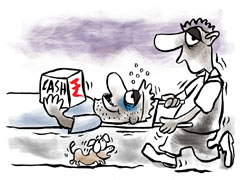Need Expert Advice?Our Gurus Can Help

Dr Shyam Jamalabad
Dentist
112 Answers | 11 FollowersFollow
Answered on Jan 23, 2026

Wisdom teeth usually "stop growing" by the age of 25, provided they are properly aligned and there's sufficient space for them to erupt. But, more often than not, they are not properly aligned or there may not be enough space for them.
Curiously, teeth never actually stop growing unless there's something blocking their growth. Like an opposing tooth, for instance. If an upper tooth is extracted and not replaced with an artificial tooth, the opposing lower tooth can theoretically keep growing into the empty space above.
Your wisdom tooth is improperly aligned and hence will continue to grow indefinitely.
Since you mentioned that it's been troubling you for several years, my advice would be to get it extracted
Answered on Jan 23, 2026

I understand why you’re worried - food getting trapped and a foul smell can be very unsettling, but no pain doesn’t automatically mean you can avoid a dentist's visit. If the tooth is partially erupted or impacted, it creates a pocket where bacteria thrive, which explains the odor and can lead to gum inflammation or a low?grade infection. Many dentists recommend _proactive_ removal when they see a high risk of future issues (crowding, decay, cysts) even without pain. On the flip side, if it’s fully erupted, easy to clean, and not messing with your bite, your dentist might just monitor it and suggest a good hygiene regimen (floss, mouthwash, water?flosser).
My advice is to get an X?ray and a dentist’s opinion. If they spot infection signs, cysts, or trouble cleaning, they’ll likely suggest extraction. If it’s clean and you can keep it infection?free, you can wait and watch.
Answered on Jan 23, 2026

You're one of very few people I know who brush and floss their teeth regularly. Keep it up!
It's important to note, however, that your brushing technique is also very important. Not just how frequently you brush.
It's possible your enamel is weak or poorly calcified which could be the reason why you keep getting cavities. If you had a calcium deficiency during childhood - when your teeth were developing - it's likely that your tooth enamel is hypocalcified and hence more prone to decay.
Saliva, like your dentist suggested, can also play a role. Acidic saliva can erode and weaken tooth enamel.
Fresh lime has a similar harmful effect on your teeth. You should at least rinse your mouth thoroughly after drinking lime water so that traces of it don't remain.
Answered on Jan 13, 2026

Good question. The answer depends on the extent of damage the tooth has suffered. If the damage is not extensive and if the tooth can be sufficiently strengthened (with a post-core, for instance), then a CROWN would be the ideal choice. In such a case, the neighbouring teeth need not be involved.
But if the tooth is extensively damaged and may not provide sufficient support for a crown, then it's necessary to take support from adjacent teeth. In such cases, a BRIDGE is better than a crown.
There are many kinds of crowns and bridges. Your dentist can guide you only after examining your damaged tooth.
Answered on Dec 05, 2025

Please be assured, AGE isn't a barrier for implants. But overall health is a factor. Your dentist will assess your bone density, gum health, and general medical history before he places your implants.
Implants have some definite advantages over removable dentures. They provide a stable and secure fit, improved chewing and speech.
And with proper care may last for 10-15 years or more.
On the negative side, upfront cost of implants can be higher, surgery cannot be avoided and healing can take 3-6 months.
Cost-wise, Implants can be more cost-effective in the long run.
"All-on-4" implants might be cheaper than individual implants, but waiting might lead to deterioration of bone health, making the process more complex.
Consult your dentist about:
- Your specific oral health situation
- Bone density scan (to check if you have enough bone for implants)
- Cost estimates and financing options
- Timeline for the procedure.
Answered on Dec 05, 2025

This situation of "2 parallel lines of teeth" arises when permanent teeth erupt BEFORE the deciduous teeth (or milk teeth) have been shed. This indicates a mis-alignment of the permanent teeth. The shedding of milk teeth is dependent on the permanent teeth exerting pressure on them as they grow.
This mis-alignment, indeed, could be the cause of his speech problem.
My advice to you is to consult a competent pediatric dentist or an orthodontist (a dentist who realigns crooked teeth) soon so that corrective measures can be taken.
Answered on Dec 05, 2025

Sorry to hear about your fall and the resultant damage to your teeth.
Honestly, it's best to follow your dentist's advice, but I understand your problem. Eating can be a challenge.
Please ask your dentist about sturdier alternatives like dental crowns or bridges. These can provide extra protection and might let you chew more comfortably.
In the meantime, stick to soft foods which do not put pressure on your compromised teeth, or soups. You can also try cutting your food into smaller pieces to reduce pressure on the tooth.
Answered on Jul 25, 2025

There could be several reasons why the space between your front teeth is increasing
Some likely causes
1. *Gum disease*: Gum disease can cause teeth to become loose and, if the infection is not treated in time, they tend to shift apart.
2. *Tooth loss*: Losing a tooth can cause adjacent teeth to shift, creating spaces.
3. *Orthodontic issues*: Misaligned teeth or a misaligned bite can lead to spacing.
4. *Habits*: Thumb sucking, tongue thrusting, or other habits can push teeth forward, creating gaps.
5. *Aging*: As we age, our teeth can shift, and gums can recede, leading to spacing.
6. *Genetics*: Some people may naturally have gaps between their teeth.
Solutions
1. *Dental bonding*: A tooth-colored resin can be applied to fill gaps.
2. *Veneers*: Thin porcelain or composite shells can be bonded to teeth to close gaps.
3. *Orthodontic treatment*: Braces or clear aligners can help realign teeth and close gaps.
4. *Gum treatment*: If gum disease is the cause, treating the gums can at least stop the space from increasing.
Please consult your dentist to determine the cause and best course of treatment for your specific situation.
Answered on Jul 25, 2025

Since your wisdom tooth has partially erupted, it's essential to monitor it regularly. Even if it doesn't hurt or bother you now, there are potential risks to consider:
1. *Infection*: Partially erupted teeth can be prone to infection, especially if bacteria accumulate in the surrounding gum tissue.
2. *Tooth decay*: The partially exposed tooth can be more challenging to clean, increasing the risk of tooth decay.
Monitoring and Maintenance is very important.
Schedule regular appointments with your dentist to monitor the tooth's progress and overall oral health.
Maintain excellent oral hygiene habits, including brushing and flossing, to reduce the risk of infection and tooth decay.
Since your other three wisdom teeth haven't erupted yet, your dentist will likely monitor them as well to assess their development and potential impact on your oral health.
If one or more of them are misaligned or likely to cause problems in the future, your dentist may recommend removal.
Your dentist will help you decide the best approach based on your individual situation.
Answered on Jul 25, 2025

Braces might be a good option for you, considering your age and the misalignment issues you're experiencing.
*Necessity of Braces:* Braces could help correct and prevent potential problems like uneven wear, tooth decay or gum disease.
You can choose orthodontic treatment for aesthetic/cosmetic correction
*Best Age for Braces:*
The teenage years are actually an ideal time for orthodontic treatment. During this period, your jaw and teeth are still developing, making it easier to correct alignment issues. Most orthodontists recommend an initial consultation around age 7, but comprehensive treatment usually starts when most permanent teeth have emerged, around 11-15 years old.
*Getting Braces Later:*
It's totally okay to get braces later in life. Many adults choose to straighten their teeth for aesthetic and health reasons. While treatment might take a bit longer for adults, the results are just as effective.
Firstly, you need to ascertain if the misalignment is causing, or is likely to cause in future, any functional problem like biting your lips or cheek, difficulty in mastication, difficulty in speaking, or food lodgement.
You could, of course, choose treatment purely for aesthetic reasons.
The next step would be to consult with an orthodontist who can assess your teeth and provide personalized advice. They'll help you determine the best course of treatment and create a plan suited to your needs
Answered on Jun 15, 2025

Not removing impacted wisdom teeth can lead to several potential risks and complications, including:
1. Pain and discomfort: Impacted wisdom teeth can cause recurrent pain, swelling, and discomfort in the jaw, gums, and surrounding teeth.
2. Infection: Impacted teeth can be difficult to clean, increasing the risk of infection, abscesses, and cysts.
3. Damage to surrounding teeth: Impacted wisdom teeth can push against adjacent teeth, potentially causing damage, crowding, or orthodontic issues.
4. Gum disease: Impacted teeth can create pockets that trap bacteria, leading to gum disease and potentially affecting overall oral health.
5. Tooth decay: Impacted teeth can be challenging to clean, increasing the risk of tooth decay and cavities.
When to Consider Extraction
1. Symptomatic teeth: If you're experiencing pain, discomfort, or other symptoms related to your wisdom teeth.
2. If your dentist recommends removal due to potential risks or complications.
Schedule regular dental check-ups to monitor the development and health of your wisdom teeth.
This helps your dentist or oral surgeon to determine the best course of action for your specific situation.
Answered on Jun 15, 2025

Some claimed benefits include:
1. Reduced bacteria: Oil pulling may help reduce bacterial load in the mouth.
2. Gum health: Some studies suggest it may help reduce gingivitis and improve gum health.
3. Bad breath: Oil pulling might help reduce volatile sulfur compounds that cause bad breath.
It's important to note that oil pulling is NOT a replacement. It should complement regular brushing, flossing, and dental check-ups.
More research is needed on the subject. While some studies show benefits, more research is required to confirm its effectiveness.
Consult an ayurvedic doctor to know more before incorporating oil pulling into your oral health routine.
Answered on Jun 15, 2025

You should take your child to a pediatric dentist (Pedodontist) at once. In some cases it is possible to minimize the misalignment with timely intervention. Whether or not any intervention is needed at this time a consultation is an absolute must. Your dentist, after evaluating the case, can give you advice on what treatment may be necessary and at what stage.
Answered on Jun 14, 2025

It’s unlikely that your teeth are bleeding. More likely that your gums (the soft pink tissues surrounding and supporting your teeth) are bleeding.
This is not a cause for alarm but certainly calls for a visit to your dentist.
It’s likely that your gums are infected or inflamed. It's possible that your gums are not getting the care and attention they need and deserve.
Trust me, gum problems can be easily treated.
Please talk to your dentist without further delay
Answered on Jun 14, 2025

At the age of 20, you're much too young to start losing teeth. I suggest you consult a dentist soon. It may still be possible to save the tooth with "the very large cavity" if you consult a dentist soon.
As for your other "very dirty" teeth, there could be external stains or deposits (called calculus or tartar - the result of inadequate or ineffective brushing) which can be easily removed. At worst, there could be multiple cavities caused by tooth decay which can also be restored with fillings or crowns.
Please note that a proper brushing technique and regular brushing will help keep your teeth healthy regardless of which brand of toothpaste you use.
Answered on May 30, 2025

Answered on May 30, 2025

Tooth sensitivity can be managed and potentially reduced with some simple steps:
Oral Care Habits
1. Use a soft-bristled toothbrush: Gentle brushing can help reduce further irritation.
2. Choose a desensitizing toothpaste: Look for products containing potassium nitrate or strontium chloride.
3. Brush correctly: Use gentle circular or vertical motions, avoiding harsh scrubbing.
Dietary Changes
1. Limit acidic foods and drinks: Avoid or reduce consumption of citrus fruits, soda, and sports drinks.
2. Avoid extreme temperatures: Try to consume food and drinks at room temperature.
Additional Tips
1. Visit your dentist: Identify underlying causes and receive personalized advice.
2. Consider a fluoride varnish or gel: Professional applications can help strengthen tooth enamel.
3. Avoid grinding or clenching: Wear a mouthguard if necessary to reduce teeth wear.
By following these steps, you can help alleviate tooth sensitivity and prevent it from worsening. Consult your dentist for further guidance.
Answered on May 10, 2025

Your jaw pain and headache may very likely be due to your teeth grinding or jaw clenching when stressed or in your sleep. This is also usually accompanied by excessive wear of your teeth enamel. Your dentist will be able to pinpoint the cause. Of course, carious or infected teeth and gums need to be first ruled out.
Ask your dentist to give you a "night guard" which acts as a soft cushion between your upper and lower teeth and provides some relief.
But first you need to work on reducing your stress levels holistically and if necessary with your physician's help
Answered on May 01, 2025

1. Poor oral hygiene
2. Gum disease
3. Dry mouth (xerostomia)
4. Food particles trapped in teeth
5. Smoking/tobacco use
6. Certain foods (garlic, onions, etc.)
7. Medical conditions (sinusitis, diabetes, etc.)
8. Medications
9. Postnasal drip
10. Gastrointestinal issues
Maintaining good oral hygiene, keeping yourself hydrated, visiting your dentist regularly, and addressing underlying issues can help manage halitosis.
For underlying medical issues please consult your physician
Answered on May 01, 2025

1. Gum recession
2. Tooth decay
3. Cracked or chipped teeth
4. Worn enamel (due to acidic foods/drinks or grinding)
5. Gum disease
6. Dental procedures (temporary sensitivity)
7. Tooth whitening products
8. Aggressive brushing
If you're experiencing tooth sensitivity, consider consulting a dentist to determine the underlying cause and find the best solution.
Answered on May 01, 2025

1. Brushing technique is inadequate (e.g., not brushing along the gum line)
2. Brushing frequency or duration is insufficient
3. Plaque buildup isn't fully removed
4. Diet high in sugars, acids, or starches contributes to plaque formation
Regular dental cleanings (Scaling) can help remove tartar and prevent its buildup. Your dentist or hygienist can also provide personalized advice on maintaining good oral hygiene.
Answered on May 01, 2025

You have to examine why you want your teeth aligned.
Do you have a functional problem as a result of the mis-alignment?
Functional problems could be speech impairment, inefficient mastication, inadvertently biting your lip, and so on.
If you have none of these problems then the only outcome would be cosmetic
Answered on May 01, 2025

Tooth sensitivity can be caused by various factors. Here are some common causes:
1. *Gum recession*: Exposed roots can cause sensitivity.
2. *Tooth decay*: Cavities can expose nerves, leading to sensitivity.
3. *Cracked teeth*: Cracks can allow bacteria to reach the pulp, causing sensitivity.
4. *Worn enamel*: Acid erosion or grinding can wear away enamel, exposing dentin. Aggressive brushing or using generous amounts of toothpaste can also damage enamel.
5. *Gum disease*: Inflammation and infection can cause sensitivity.
6. *Dental procedures*: Sensitivity can occur after procedures like fillings, crowns, or teeth whitening.
7. *Tooth grinding or clenching*: Grinding or clenching can wear away enamel and cause sensitivity.
8. *Acidic foods and drinks*: Consuming acidic foods and drinks can erode enamel.
Managing Tooth Sensitivity
If you're experiencing tooth sensitivity, consider:
1. Using a desensitizing toothpaste
2. Avoiding acidic foods and drinks
3. Practicing good oral hygiene
4. Visiting your dentist for a check-up and advice
Your dentist can help determine the underlying cause and recommend the best course of treatment.
Answered on Jan 23, 2025

Teeth shifting and causing gaps to appear at your age (where there were no gaps earlier) strongly suggests weakness of gums.
Kindly consult a dentist to have your gum condition assessed and treated. Proper gum treatment can stop teeth shifting further and the gaps getting bigger. But cannot reverse the shifting that has already occurred.
Once the gums have been stabilised you may need to undergo corrective orthodontic treatment.
Tooth aligners, also known as clear aligners, can be used by people to have their teeth straightened or to have gaps between teeth closed. Thanks to advancements in dental treatment there is no strict upper age limit for using tooth aligners. Many adults in their 30s, 40s, and 50s, have successfully used aligners to straighten their teeth.
However, before using tooth aligners, it's essential to consult with an orthodontist or a dentist to determine if aligners are suitable for your specific needs and age. And please use aligners only under an orthodontist's supervision.
Answered on Jan 23, 2025

Early dental visits can help:
1. Get your child accustomed to the dentist's chair and instruments. To be brought to a dental clinic for the first time when the child is already in pain can be very intimidating.
2. Identify any oral health issues early on, such as tooth decay or gum problems.
3. Provide guidance on proper oral hygiene and diet.
4. Establish a lifelong habit of regular dental check-ups.
Some signs that your child may need to visit the dentist earlier than the recommended six months to one year include:
- Visible signs of tooth decay
- White or brown spots on the teeth
- Gum inflammation or bleeding
- Difficulty feeding or swallowing
Consult with a pediatric dentist (also called pedodontists) for personalized advice.
Answered on Jan 22, 2025
Aapka last dant bachane layak hai ki nahi woh pehle dekhna padega.
Last ka dant bachana aksar mushkil hota hai kyon ki hamari drilling machine wahan tak aasani se pohochti nahi.
Agar bachana mumkin hai to dant ko avashya bachane ki koshish Karni chahiye.
Agar na mumkin hai toh usko nikalva lijiye
Answered on Jan 18, 2025

The condition you describe is rather common and usually linked to poor oral hygiene. Mobility of teeth and exposure of the roots is caused by abnormal recession of gums and simultaneous bone loss.
Please consult a Periodontist (a dentist who has specialised in treatment of diseases of the gums and jawbone). Provided the condition is not severe, it may be possible to save her teeth with periodontal surgery which may involve placement of bone grafting material or bone substitutes.
Answered on Jan 11, 2025

Only a few of us are lucky enough to be born with pearly white teeth. The rest of us have to make do with teeth which have a naturally creamish, greyish or brownish tinge of varying degree. I am, of course, not referring to those who choose to have poor oral hygiene or are addicted to smoking or chewing tobacco.
I'm afraid brushing well - or even brushing obsessively - is not going to make your teeth any whiter. On the contrary, brushing excessively or brushing hard can make your teeth look even more discoloured by unintentionally wearing away the enamel (the hard, outermost and whitest of the tooth's layers)
Over-the-counter whitening products are essentially mild versions of chemical bleaching agents (intentionally kept mild because such products are used unsupervised) which have limited effect or may take a long time to show results.
Your dentist, on the other hand, can bleach your teeth using suitable agents of stronger concentration which will show quicker and more visible effect.
In some cases, where the discoloration cannot be corrected by bleaching, you may need to have veneers made for your front teeth which will 'hide' the discoloration.
Please consult your dentist to know your best option.
Answered on Dec 19, 2024

I'm happy to know you brush and floss regularly. Please continue to do so.
While poor oral hygiene is the leading cause of bad breath, it is definitely not the only cause. Please be informed that it can be caused by various other factors, too.
Here are some of the most common causes of bad breath, also known as HALITOSIS.
Oral Health Issues
1. _Poor oral hygiene_: Infrequent brushing and flossing can lead to the buildup of bacteria, plaque, and tartar, causing bad breath.
2. _Gingivitis and gum disease_: Inflammation and infection of the gums can cause bad breath.
3. _Tooth decay and cavities_: Bacteria in the mouth can break down food particles, especially sugars, and release volatile sulfur compounds (VSCs) that cause bad breath.
Food and Drinks
1. _Onions and garlic_: These foods contain sulfur compounds that can be released in the mouth and cause bad breath.
2. _Coffee and tobacco_: These substances can dry out the mouth, leading to an increase in bacteria and VSCs.
3. _Spicy or acidic foods_: Foods like citrus fruits, tomatoes, and spicy dishes can irritate the mouth and cause bad breath.
Medical Conditions
1. _Diabetes_: Uncontrolled diabetes can lead to dry mouth, which can contribute to bad breath.
2. _Gastroesophageal reflux disease (GERD)_: Stomach acid can flow up into the mouth, causing bad breath.
3. _Sinus infections and respiratory issues_: Postnasal drip and respiratory infections can cause bad breath.
4. _Kidney disease and liver disease_: These conditions can cause a buildup of toxins in the body, leading to bad breath.
Lifestyle Factors
1. _Smoking and tobacco use_: Tobacco products can dry out the mouth and cause bad breath.
2. _Alcohol consumption_: Excessive alcohol consumption can lead to dry mouth and bad breath.
3. _Medications_: Certain medications, such as antidepressants, antihistamines, and decongestants, can cause dry mouth and bad breath.
4. _Hormonal changes_: Hormonal fluctuations during menstruation, pregnancy, or menopause can lead to bad breath.
Other Factors
1. _Dry mouth_: A lack of saliva can contribute to bad breath.
2. _Mouth breathing_: Breathing through the mouth instead of the nose can dry out the mouth and cause bad breath.
3. _Poor digestion_: Undigested food particles in the stomach can be released into the mouth, causing bad breath.
If you're concerned about bad breath, it's essential to consult your dentist so that he can examine your teeth and gums thoroughly to rule out local factors and address any underlying medical conditions.
Mouthwashes definitely help by keeping the oral bacteria under control. At least temporarily. They mask mouth odours and give you a feeling of freshness.
But the root cause of the problem still needs to be identified and suitably treated. Also, please note that mouthwashes are not a substitute for regular brushing and flossing.
Your dentist will guide you on what mouthwash suits you best depending on your lifestyle, oral hygiene and medical history.
Meanwhile, here are some good attributes to look for in a mouthwash:
Active Ingredients
1. _Antibacterial agents_: Chlorhexidine, triclosan, or essential oils (e.g., tea tree oil) to combat bacteria and plaque.
2. _Anti-inflammatory agents_: Ingredients like aloe vera or chamomile to reduce gum inflammation.
3. _Antifungal agents_: Ingredients like domiphen bromide to combat fungal infections.
4. _Fluoride_: To strengthen tooth enamel and prevent decay.
Additional Benefits
1. _Anti-plaque and anti-gingivitis properties_: To help prevent the buildup of plaque and reduce the risk of gingivitis.
2. _Bad breath prevention_: Ingredients like chlorine dioxide or zinc to help eliminate volatile sulfur compounds (VSCs) that cause bad breath.
3. _Sensitivity relief_: Ingredients like potassium nitrate or strontium chloride to help desensitize nerves and provide relief from tooth sensitivity.
4. _Whitening agents_: Mild abrasives or hydrogen peroxide to help remove surface stains and whiten teeth.
Safety and Comfort
1. _Alcohol-free_: To avoid drying out the mouth and reducing saliva production.
2. _Sugar-free and artificial sweetener-free_: To make the mouthwash suitable for people with dietary restrictions or preferences.
3. _pH balanced_: To ensure the mouthwash doesn't disrupt the natural pH balance of the mouth.
4. _Gentle and non-irritating_: To minimize the risk of mouth irritation, especially for people with sensitive teeth or gums.
Answered on Dec 19, 2024

Home Treatment and Prevention:
1. *Brushing and Flossing*: Brush your teeth at least twice a day and floss once a day to remove plaque and food particles.
2. *Saltwater Rinse*: Rinse your mouth with warm saltwater several times a day to reduce inflammation and kill bacteria.
3. *Antibacterial Mouthwash*: Use a commercial hydrogen peroxide/chlorhexidine gluconate mouthwash to kill bacteria and reduce inflammation.
4. *Dietary Changes*: Eat a balanced diet rich in fruits, vegetables, and whole grains, and avoid sugary and processed foods.
5. *Vitamin C* plays a significant role in gingival health. So make sure you have fresh citrus fruits (preferably unrefrigerated) on a regular basis. The other option is to take Vitamin C supplements.
When to Consult a Dentist:
1. *Persistent Gingivitis*: If your gingivitis persists despite good oral hygiene practices and home remedies.
2. *Severe Symptoms*: If you experience severe symptoms like bleeding gums, pain, or swelling.
3. *Gum Recession*: If you notice gum recession or exposed roots.
4. *Loose Teeth*: If your teeth become loose or mobile.
Remember, while home treatment and natural remedies can help manage mild gingivitis, regular dental check-ups and professional cleanings are essential to prevent and treat gum disease.
Answered on Nov 29, 2024

This type of tooth decay is rather common in children. Most parents dismiss it as inconsequential because "milk teeth fall off anyway" and do not seek professional advice. I am happy to note that you are concerned and have already consulted a couple of dentists.
As long as your son's decayed teeth are asymptomatic, I would agree with your local dentists that, for now, no procedures should be done.
The logic is simple. A visit to the dentist is stressful even for adults. I imagine it would be even more so for a child of 4 or 5!
If the teeth in question are free from pain or underlying infection, we (the dental fraternity) would rather not expose the child to procedures which could potentially instill in him a lifelong fear of dentists and dental clinics.
However I strongly urge you to take your child for periodic check ups to ensure the decay doesn't spread unchecked and/or can be treated in time if the need arises. Please note if these teeth get infected and the infection is left untreated, the permanent teeth can also get damaged.
Also, you (the parent) need to inspect the said teeth and surrounding gums regularly to spot gum boils or swellings. If you spot any of this or if the child complains of pain please consult your dentist at once.
It goes without saying that he should brush his teeth with even more care. Ideally after every meal. Children cannot be fully trusted to brush their teeth well, so it's always wise for a parent to supervise.
If your son is a fussy eater you could consider giving him Calcium supplements. This will not help his current teeth in any way, but the permanent teeth which are due to erupt a few years later will hopefully be more resistant to decay.
Hope this answers your question.
Answered on Nov 29, 2024

I understand your anxiety. A visit to the dentist can be stressful, especially if you have had a bad experience.
Here are some key factors to help you identify a good dentist:
1. *Qualifications*: Check for a degree from a reputable dental school and valid licenses.
2. *Experience*: Consider a dentist with extensive experience in general dentistry or specialized fields like orthodontics or oral surgery.
3. *Communication*: A good dentist listens attentively, explains procedures clearly, and answers questions patiently.
4. *Chairside manner*: A caring and compassionate attitude can make dental visits less stressful.
5. *Up-to-date technology*: Modern equipment and digital X-rays indicate a commitment to quality care.
6. *Sterilization and hygiene*: Ensure proper sterilization techniques and a clean environment.
7. *Continuing education*: A good dentist stays updated on the latest techniques and advancements.
8. *Patient reviews*: Research online reviews and ask for referrals from satisfied patients.
9. *Professional affiliations*: Membership in organizations like the Indian Dental Association (IDA) or local dental societies indicates a commitment to ethical standards.
10. *Comfort level*: Trust your instincts and choose a dentist with whom you feel comfortable discussing your concerns and treatment options.
11. *Clear treatment plans*: A good dentist explains procedures, costs, and alternatives clearly.
12. *Emergency care*: Find out their policy for handling dental emergencies and after-hours care.
13. *Office hours and location*: Consider a dentist with convenient office hours and a location that suits your needs
By evaluating these factors, you can find a skilled and caring dentist who meets your oral health needs.
Answered on Nov 29, 2024

Dark stains on front teeth can be caused by various factors, including:
1. Poor oral hygiene: Inadequate brushing and flossing can lead to plaque and tartar buildup, causing stains.
2. Coffee, tea, and wine consumption: Chromogens in these beverages can bind to tooth enamel, causing discoloration.
3. Tobacco use: Smoking or chewing tobacco can cause significant staining.
4. Trauma or injury: Blood from the injury can seep into the tooth, causing discoloration.
5. Medications: Certain medications, like tetracycline and doxycycline, or iron supplements can cause tooth discoloration as a side effect.
6. Other factors include enamel hypoplasia (caused by a deficiency of Calcium) or fluorosis (caused by exposure to an excess of fluoride during the tooth developmental stage)
To address dark stains on front teeth, consider the following options:
1. Professional scaling and polishing. In severe cases teeth whitening or bleaching may be necessary.
2. Dental bonding or veneers
3. Enamel microabrasion (for fluorosis or enamel hypoplasia)
4. Improved oral hygiene habits
5. Avoiding stain-causing beverages or using a straw
6. Quitting tobacco
Consult a dentist to determine the best course of treatment based on the underlying cause and severity of the stains.
Answered on Nov 15, 2024

For toddlers and young children, it's essential to choose a toothpaste that is safe and effective for their developing teeth and gums. Here are some recommendations:
1. *Fluoride-free toothpaste* (0-2 years): For infants and toddlers, a fluoride-free toothpaste is recommended. Look for a toothpaste specifically designed for this age group, like "Baby Toothpaste" or "Training Toothpaste". Please note that Fluoride, although extremely beneficial when used locally can lead to fluorosis if accidentally ingested. This is the reason toddlers need to use fluoride-free toothpastes.
2. *Children's toothpaste with low fluoride* (2-6 years): For young children, a toothpaste with a low fluoride concentration (around 500-600 ppm) is suitable. This helps prevent fluorosis (white spots on teeth) while still providing cavity protection.
3. *Gentle ingredients*: Opt for a toothpaste with gentle ingredients, to minimize irritation.
5. *Flavor and texture*: Select a toothpaste with a child-friendly flavor and texture to make brushing teeth a fun experience!
Most popular toothpaste brands offer multiple options for toddlers and young children.
In addition to these there are a few brands specially formulated for children which are ethically promoted (not commercially advertised, but sold through chemists on dentists' prescriptions) You may speak to your child's dentist for specific recommendations.
Remember to always supervise your child while brushing teeth and teach them proper oral hygiene habits from an early age!
Answered on Nov 14, 2024

1. Ask for referrals: Ask friends, family, or coworkers for recommendations. They can provide valuable insights into a dentist's work quality and chairside manner.
2. Check credentials: Ensure the dentist has the necessary qualifications, certifications, and licenses. You can verify this information with your state's dental board or professional organizations like the American Dental Association (ADA).
3. Check online reviews: Look up the dentist on review platforms. Pay attention to the overall rating and read the comments to understand the strengths and weaknesses. At the same time, do not rely on reviews alone as these can be manipulated, fake reviews can be easily generated.
4. Evaluate their communication style: A good dentist should listen to your concerns, explain procedures clearly, and answer questions patiently. Ensure you feel comfortable asking questions and discussing your treatment.
5. Assess their facility and equipment: A well-organized and modern dental office with up-to-date equipment is a good sign.
6. Check their approach to preventive care: A capable dentist emphasizes preventive care, including regular cleanings, exams, and education on oral hygiene.
7. Be wary of over-treatment: A honest dentist will not recommend unnecessary procedures. Be cautious if you feel pressured into extensive treatments.
8. Trust your instincts: If something feels off or you don't click with the dentist, it's okay to explore other options.
10. Schedule a consultation: Many dentists offer initial consultations or meet-and-greets. Use this opportunity to assess their approach, ask questions, and gauge your comfort level.
By following these steps, you can increase your chances of finding a capable and honest dentist who prioritizes your oral health and well-being.
Answered on Nov 14, 2024

You have not mentioned whether you have consulted a dentist for your gum inflammation and were treated in the past for the same.
The most common cause for gum inflammation is poor oral hygiene. Inadequate or improper brushing can lead to accumulation of tartar or calculus which in turn leads to gum inflammation. This tartar or calculus has to be cleaned (the process is called scaling) periodically by a qualified dentist in order to maintain gum health. The recommended frequency can be determined by your dentist after periodic check ups.
If you have gum inflammation despite regular check ups and cleaning, other factors could be responsible.
Certain medicines which need to be taken on a regular basis are known to cause swelling of the gums. Hormonal imbalances can also affect the gums. To rule out these extra-oral factors, your medical history and medication will have to evaluated and adjusted by a General Physician.
Answered on Nov 14, 2024

Please consult your dentist.
In my opinion gum polyps cannot be treated with medicines alone. They may require surgical removal. Please do not be intimidated. It's a very, very minor procedure.
Also the cause has to be identified and suitably treated to prevent recurrence. So please do not rely on home remedies or medicines alone.
Answered on Nov 14, 2024

You are not alone.
Tooth erosion refers to loss of natural tooth structure (enamel/dentine) due to acidic action. Tooth erosion is relatively common as many of us suffer from hyperacidity in varying degrees. Hyperacidity can be caused by a variety of factors. Stress, lack of sleep, irregular meal timings, poor dietary choices, etc
Enamel erosion can make your teeth extremely sensitive to hot, cold, sweet or sour elements in our diet.
Enamel loss due to acidic erosion can be exacerbated by aggressive brushing, use of excessive or abrasive toothpastes. This is referred to as tooth abrasion.
While loss of natural tooth structure due to erosion or abrasion can never be got back, there are ways to treat the symptoms of erosion. Kindly consult your dentist who can evaluate the extent of damage and suggest a suitable remedy. It could be as simple as using a desensitising medicated toothpaste to "desensitise" your teeth. Or could require the placement of fillings, laminates or crowns.
You may also need to consult your General Physician to control your hyperacidity.
For starters, you should cut down on all acidic food and carbonated drinks. And also learn to brush your teeth gently with a minimal amount of toothpaste.
Hope this answers your query
Answered on Oct 28, 2024

How often you need to change your toothbrush depends entirely on your tooth brushing habits. If you're inclined to brush vigorously, exerting a lot of pressure (which is not good, you need to be gentle) then you may need to change your brush frequently.
If you use a HARD brush, it will last you longer. SUPER SOFT brushes will last the least. I normally recommend MEDIUM brushes if your gums are healthy.
The Golden rule, however, is to change your toothbrush when it starts to "flower". When the bristles curl outwards like the petals of a blossoming flower.
Answered on Oct 02, 2024

You can safely go ahead with whatever dental treatment you need. But please inform your dentist about your medical history and what medication you take. Also consult your physician about the planned dental treatment and what medication your dentist thinks you may need to take during the course of the treatment.
Answered on Sep 06, 2024

It’s sad that you've been suffering for the past 4 years and no lasting solution has been provided. It is quite possible that your problem is not dental in origin. You have clearly stated that you have consulted several dentists (including a TMJ specialist) so it is safe to assume that you no longer have any untreated dental infection or abnormality.
My advice to you would be to consult a reputed Neurologist or Pain Management specialist.
Answered on Aug 31, 2024

Please visit your dentist for a basic consultation. If the enamel of your teeth has worn away due to acidic erosion or excessive abrasion he will likely recommend a suitable desensitising toothpaste.
If you suffer from hyperacidity or acid reflux please consult your physician for proper guidance
Answered on Aug 31, 2024

To answer your second question first, milk teeth (also called Deciduous teeth) are usually shed by the age of 12-13 yrs. So in all likelihood all the teeth currently visible in your son's mouth are permanent teeth. Please note his wisdom teeth (or third molars) will erupt at a later stage. Typically, between 18 and 25.
Please consult your dentist to find out why your son's teeth are discoloured and whether they need cleaning or whitening
Answered on Aug 27, 2024

Please see your dentist first. Let him rule out decayed teeth/ infected gums/ mouth breathing as being the likely causes of your problem. If he finds no abnormalities he may ask you to consult an ENT Surgeon who will take the investigation forward.
Answered on Aug 27, 2024

Answered on Aug 18, 2024

1.Yes, this is a permanent solution. Please note she'll have to continue wearing braces for some time even after the gap has closed. This is to ensure that the teeth have stabilised in their new positions and will not return to their original positions. If the braces are discontinued abruptly there is a chance of the gap reopening.
2. After the active treatment period and the stabilisation period are over there will be no restrictions and she can start eating and drinking like normal
Answered on Aug 15, 2024

The toothpaste you mentioned is a desensitizing toothpaste. It helps by forming a chemical barrier over the sensitive dentine, thus reducing the discomfort you feel when you have anything cold, sweet or sour. But it should be used daily for a sufficiently long period (typically a few weeks) to have the desired result.
Answered on Aug 13, 2024

Tooth cleaning (Scaling and polishing) will not damage ceramic or natural tooth enamel. Please do not have any apprehensions on this issue. The equipment used for scaling (ultrasonic/piezo scalers) are designed to be very gentle and your dentist has the necessary skills to avoid causing any damage.
Answered on Jul 14, 2024
Answered on Jul 12, 2024

Hypersalivation (excessive saliva production) can be caused by many factors. To find the root cause of your condition these factors will have to be systematically ruled out.
For a start, you could try switching your sleeping position and check if saliva still accumulates in your mouth. Like when you sleep on your back, for instance.
Next would be to consult your dentist to rule out tooth decay or gum infection. If that is ruled out you should consult your General Physician to check for other infections, allergies, other underlying conditions like acid reflux, respiratory infection, etc
The underlying cause, once determined, can easily be treated.




